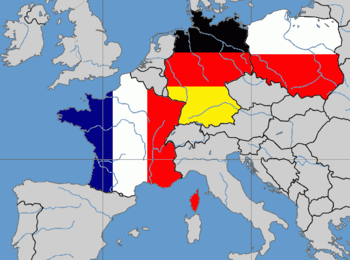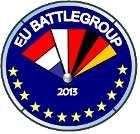Weimar Triangle
The "Weimar Triangle" is, loosely, a grouping of Poland, Germany, and France. The group is intended to promote co-operation between the three countries in crisis zones.[1] It exists mostly in the form of summit meetings between the leaders of these three countries, and of their foreign ministers. The most recent summit of leaders occurred on 7 February 2011.[2] Previous meetings took place in Poznań, Poland (1998), Nancy, France (1999), Hambach, Germany (2001) and Nancy, France (2005). The summits of Foreign Ministers have been more regular, running at least through 2016.

The most recent leaders' summit was hosted by President Bronisław Komorowski of Poland and attended by President Nicolas Sarkozy (France) and Chancellor Angela Merkel (Germany). Issues of renewing regular Weimar Triangle meetings, the Egyptian situation and improving relations with Russia were discussed (Among other topics). Both Germany and France urged Poland to join the pact for competitiveness.
History

The Weimar Triangle was established in the German city of Weimar in 1991, aimed at assisting Poland's emergence from Communist rule. Attending the meeting were the Foreign Ministers of each state: Roland Dumas of France, Hans-Dietrich Genscher of Germany, and Krzysztof Skubiszewski of Poland. Genscher chose Weimar for the inaugural meeting because it was situated in former East Germany.[3]
At the 1992 meeting of the Weimar Triangle in France, Poland won agreement from Germany and France that it should have special association status at the Western European Union, the European arm of NATO.[3]
On 5 July 2011, Poland, France, and Germany signed an agreement in Brussels to put together a unit of 1,700 soldiers, called the Weimar Battlegroup, that will be ready to deploy in crisis zones starting in 2013. The EU business newsletter reports that Poland will command the group, providing the core combat troops and a mechanised battalion, Germany will provide logistical support, and France will contribute medical support. The operational command centre will be based in Mont Valerien, located in a Paris suburb.[1]
Shortly after the referendum on the status of Crimea held on 16 March 2014, the chairpersons of the Weimar Triangle parliament's committees on foreign affairs – Elisabeth Guigou of France, Norbert Röttgen of Germany and Grzegorz Schetyna of Poland – visited Kyiv to express their countries’ firm support of the territorial integrity and the European integration of Ukraine.[4] This was the first time that parliamentarians of the Weimar Triangle had ever made a joint trip to a third country.[5]
In April 2016, Poland's foreign minister Witold Waszczykowski told daily newspaper Gazeta Wyborcza that the Weimar Triangle had lost its relevance for his country.[6]
On 28 August 2016, representatives of the three countries vowed to "reinvigorate" the Weimar Triangle. German foreign minister Frank-Walter Steinmeier said the group would meet before the end of 2016, and French foreign minister Jean-Marc Ayrault said France would host a summit in November 2016. The stated reasoning for this reinvigoration were the decision of the United Kingdom to leave the European Union, as well as the ongoing European migrant crisis.[7]
Summits of foreign ministers
- 28–29 August 1991 in Weimar, Germany[8]
- 23–24 April 1992 in Bergerac, France
- 11–12 November 1993 in Warsaw, Poland
- 14–15 September 1994 in Bamberg, Germany
- 26 October 1995 in Paris, France
- 19 December 1996 in Warsaw, Poland
- 19 November 1997 in Frankfurt/Oder, Germany
- 6 January 1999 in Paris, France
- 30 August 1999 in Weimar, Germany
- 7 June 2000 in Kraków, Poland
- 16 January 2002 in Paris, France
- 15 May 2004 in Berlin, Germany
- 27 June 2005 in Nancy, France
- 2005 in Warsaw, Poland
- June 2008 in Paris, France
- June 2009 in Weimar, Germany
- 26–27 April 2010 in Bonn, Germany
- 20 May 2011 in Bydgoszcz, Poland
- 29 February 2012 in Berlin, Germany
- 23 June 2012 in Warsaw, Poland
- 31 March-1 April 2014 in Berlin and Weimar, Germany[9]
- 3 April 2015 in Wrocław, Poland[10]
- 28–29 August 2016 in Weimar and Berlin, Germany[11]
Summits of heads of state
- 21 September 1993 in Gdańsk, Poland
- 21 February 1998 in Poznań, Poland
- 7 May 1999 in Nancy, France
- 27 February 2001 in Hambach, Germany.
- 9 May 2003 in Wrocław, Poland. Held a few days before the referendum on the entry of Poland in the European Union.
- 19 May 2005 in Nancy, France
- 5 December 2006 in Mettlach, Germany
- 7 February 2011 in Warsaw, Poland
Summit on 3 July 2006 in Weimar, Germany was postponed due to alleged indisposition of the Polish president Lech Kaczyński.
Summits of Defence Ministers
In March 2015, Germany's Minister of Defence Ursula von der Leyen hosted her counterparts Jean-Yves Le Drian of France and Tomasz Siemoniak of Poland to revive a meeting format intended to promote co-operation between the three countries in crisis zones; it was the first meeting between the Weimar Triangle defence ministers since 2007.[12]
Summits of Ministers of European Affairs
- 30 September 2015 in Paris, France
In January of 2020, the ministers of European Affairs met again in Paris, where they discussed among other things the rule of law and the 10-year EU budget. They also visited a special painting exhibit about Poland’s history at The Louvre[13].
Joint meetings of the Committees on European Affairs
See also
References
- AFP, Germany, France and Poland form EU battlegroup EUbusiness. Retrieved 5 July 2011.
- "Leaders in Warsaw can’t cover up EU budget rift" Thenews.pl, News from Poland. Retrieved 7 February 2011.
- Sarah Helm (23 May 1996), 'Weimar Triangle' takes shape for power The Independent.
- Weimar Triangle countries support the territorial integrity and European integration of Ukraine Ministry of Foreign Affairs of Ukraine, press release of 11 April 2014.
- Parlamentarier des Weimarer Dreiecks: Röttgen, Guigou und Schetyna in Kiew Bundestag, press release of 8 April 2014.
- Matthias Szczerbaniewicz (6 April 2016), "Weimarer Dreieck" beendet: Polens Abkehr vom alten Europa ZDF.
- Shalal, Andrea (28 August 2016). "Germany, Poland and France revive Weimar group to bolster EU confidence". Reuters. Weimar, Germany. Retrieved 28 August 2016.
- "France-Diplomatie - Ministry of Foreign Affairs and International Development". diplomatie.gouv.fr. Retrieved 5 December 2014.
- Timothy Jones (23 May 1996), Germany, France, Poland call for new EU approach to eastern neighbors Deutsche Welle.
- Joint Communique of the Weimar Triangle Foreign Ministers Frank-Walter Steinmeier (Germany), Laurent Fabius (France), and Grzegorz Schetyna (Poland) in Wrocław, 3 April 2015 Federal Foreign Office of Germany, press release of 3 April 2015.
- Weimar Triangle – Meeting between Jean-Marc Ayrault and his German and Polish counterparts (Weimar and Berlin, 28-29 August 2016) Ministry of Foreign Affairs and International Development, press release of 26 August 2016.
- MoD Siemoniak: EU needs new security strategy Polskie Radio, 31 March 2015.
- "Weimar Triangle – Amélie de Montchalin's meeting with her German and Polish counterparts (Lens, 21 Jan. 2020)". France Diplomate. Ministry for Europe and Foreign Affairs (France). Retrieved 25 April 2020.